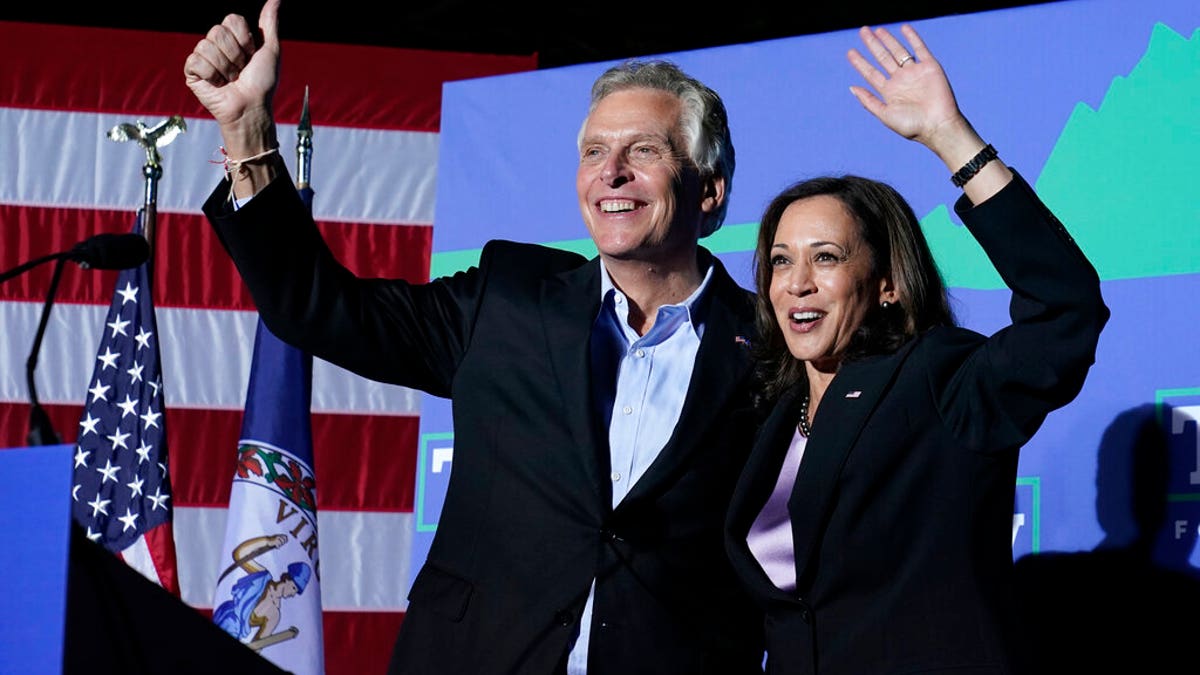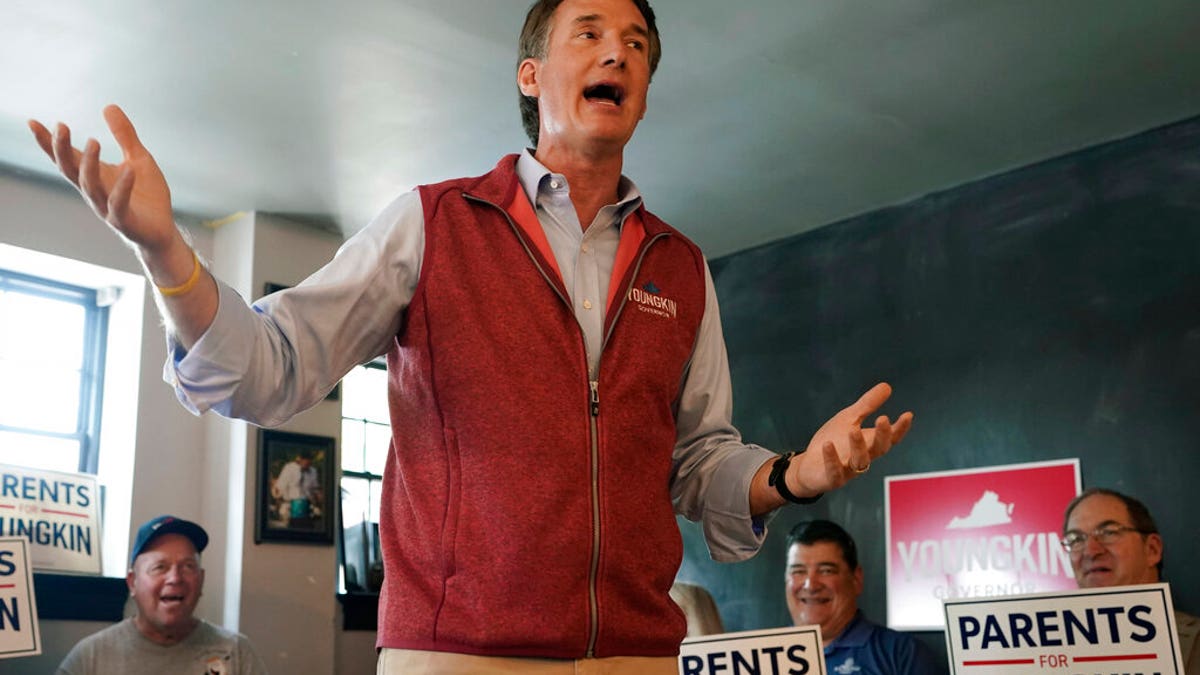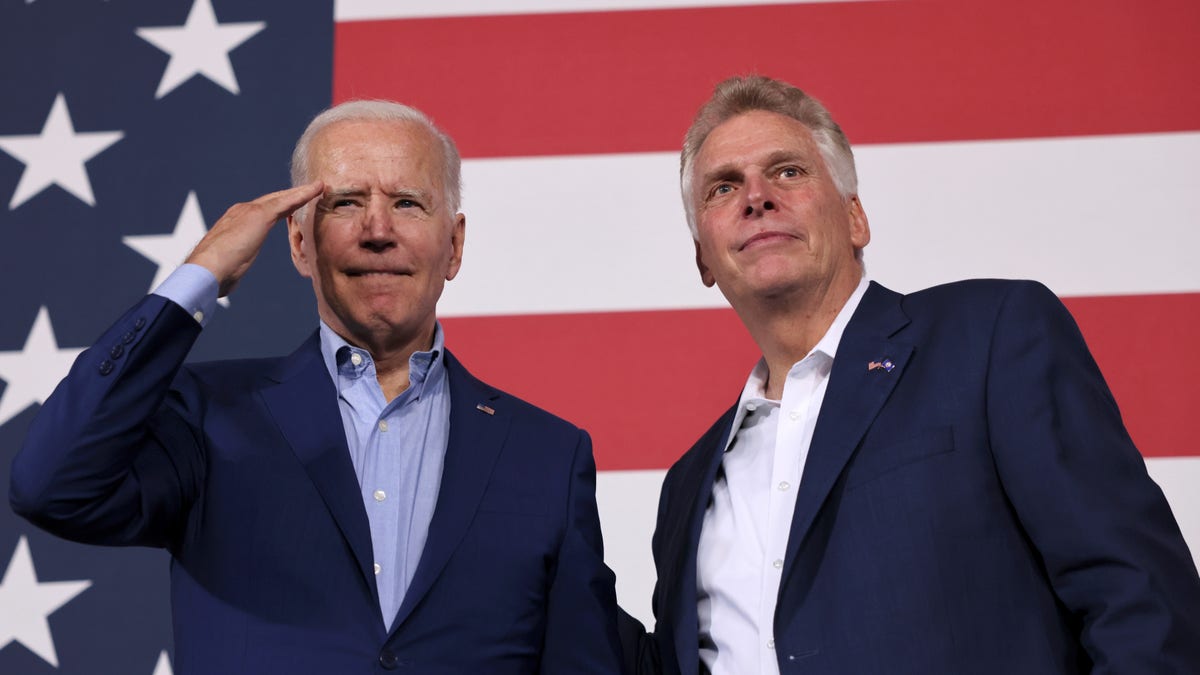Virginia voters discuss their top concerns ahead of gubernatorial election
Fox News' Lawrence Jones speaks to Virginia voters in Leesburg about their biggest concerns including education, mask mandates and inflation.
The highly competitive Virginia gubernatorial showdown between former Democratic Gov. Terry McAuliffe and Republican nominee Glenn Youngkin is a closely watched statewide race with national implications.
The face-off is seen as a key bellwether ahead of the 2022 midterm elections, when the GOP aims to win back majorities in the House of Representatives and Senate.
Here are eight things to know about the gubernatorial showdown in the commonwealth.
AS CLOSE AS YOU CAN GET: MCAULIFFE AND YOUNGKIN DEADLOCKED IN VIRGINIA
Why is there a race for governor if it’s an off-election year?
Virginia and New Jersey are the only two states in the nation to hold races for governor in the year after a presidential election. And that guarantees they both receive outsized attention across the country.
Since New Jersey is a solidly blue state, Virginia – which remains competitive between the two major parties - grabs the lion’s share of the national spotlight.
Who is the Democratic nominee?
Former Gov. Terry McAuliffe is the Democratic nominee. McAuliffe, a longtime close friend and adviser to Bill and Hillary Clinton, served as Democratic National Committee chair from 2001-2005 and later chaired Hillary Clinton’s 2008 unsuccessful presidential campaign. He first ran for Virginia governor in 2009, losing a primary bid before his successful campaign four years later in 2013. McAuliffe was barred from running for reelection by Virginia's unique law that prevents governors from serving consecutive terms.

Vice President Kamala Harris waves to the crowd along with Democratic gubernatorial candidate former Virginia Gov. Terry McAuliffe, left, during a rally in Dumfries, Virginia, Thursday, Oct. 21, 2021. McAuliffe will face Republican Glenn Youngkin in the November election. (AP Photo/Steve Helber) (AP )
McAuliffe two years ago flirted with a run for the Democratic presidential nomination but ended up backing now-President Biden.
The 64-year old McAuliffe, thanks in part to his massive advantage in name recognition and fundraising, easily won the Democratic gubernatorial primary in June against four lesser-known but younger and more diverse rivals. He’s aiming to become the first Virginia governor in nearly half a century to be elected to multiple terms.
Who is the Republican nominee?
First-time candidate Glenn Youngkin is the GOP’s nominee for governor in Virginia.
The 54-year old Youngkin, a former private equity CEO, secured the contested Republican nomination during May’s state GOP convention.

Virginia Republican gubernatorial candidate Glenn Youngkin gestures a he talks with supporters during a rally in Culpeper, Virginia, Wednesday, Oct. 13, 2021. Youngkin faces former Gov. Terry McAuliffe in the November election. (AP Photo/Steve Helber) (AP )
Youngkin, who made his fortune as an executive with The Carlyle Group investment firm, has loaned his campaign more than $15 million this year.
Why you should care about the race if you don’t live in Virginia
There's a long-running trend of voters in the commonwealth defeating the gubernatorial nominee of the party that controls the White House. McAuliffe broke with that tradition in 2013 with his election as governor in the year after President Obama was reelected.
Republicans haven't won statewide in Virginia in a dozen years, and Biden carried the state by 10 points last November.
But the one-time battleground remains a very competitive state and is seen as a key barometer ahead of the 2022 midterm elections. The closely watched competitive contest for governor has national Democrats on edge as they defend their razor-thin majorities in the House of Representatives and Senate in next year’s contests. If Youngkin defeats McAuliffe, there will be a surge in Democratic anxiety regarding their fate in the midterms.
How close is the contest?
It’s dead even, according to multiple polls, including a USA Today/Suffolk University survey of Virginia likely voters that was conducted Oct. 21-24, with McAuliffe at 45.6% and Youngkin at 45.2%. An average of all of the most recent surveys indicates McAuliffe with less than a two-point edge over Youngkin, meaning it’s a margin-of- error race.
McAuliffe held a mid-single-digit advantage over Youngkin over the summer, but the showdown has tightened since Labor Day.
What are the major issues?
An earlier Monmouth poll indicated that jobs and the economy are the top issue in the race, with education and schools the second-highest priority for voters. Combating COVID and the combustible issue of abortion are also playing a significant role in the showdown.
The Trump and Biden factor
They’re not on the ballot, but Biden and former President Trump are front and center in the Virginia gubernatorial race.
Polling indicates that Trump remains unpopular in Virginia and McAuliffe doesn’t waste an opportunity to tie Youngkin – who’s been endorsed by the former president – to Trump. McAuliffe also links Youngkin to Trump in many of his campaign commercials running statewide.

President Biden participates in a campaign event with candidate for Governor of Virginia Terry McAuliffe, at Lubber Run Park in Arlington, Virginia, July 23, 2021. (REUTERS/Evelyn Hockstein) (Reuters)
The current president is also impacting the race, thanks to his flagging approval ratings in Virginia. And the inability of Democrats in Congress the past couple of months to agree on a massive social spending and human infrastructure package is also doing McAuliffe no favors.
Demographics and geography
Gains among independent voters and suburbanites – especially suburban women - helped the Democrats win back the House in the 2018 midterms and put Biden over the top against Trump in last November’s presidential election.
CLICK HERE TO GET THE FOX NEWS APP
But, the latest surveys suggest Youngkin’s made gains among both independents and females – at McAuliffe’s expense.
And the Monmouth poll indicates that Youngkin’s increased his already enormous lead in western Virginia – the reddest part of the state – while McAuliffe’s large lead in heavily blue and mostly suburban Northern Virginia has slipped slightly. The survey indicates that McAuliffe retains single-digit advantages in the Hampton Roads region and Richmond/I-95 corridor.







